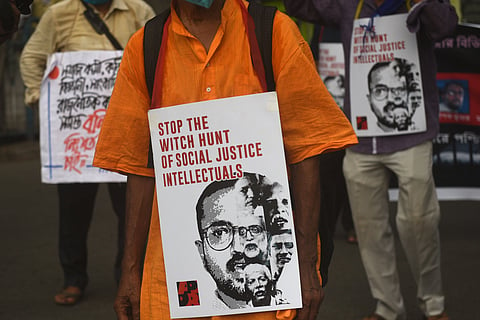Alpa Shah on the Bhima Koregaon case and India’s democratic decline: State of Southasia #22
The Bhima Koragaon case has come to be seen as emblematic of the gravest problems with India's democracy. Between June 2018 and October 2020, 16 people were arrested, accused of inciting violence in a riot and of being part of a conspiracy to assassinate India’s prime minister Narendra Modi. The arrests occurred despite the lack of credible evidence. The 16 individuals, who came to be called the BK-16, had all been working towards social justice causes, specifically on issues affecting India's minority communities – the Adivasis, Dalits and Muslims.
Almost six years after the first arrest, charges against them have not been framed and the trial has not begun. Some of the BK-16 are presently out on bail, and some remain in jail. In her book, The Incarcerations: Bhima Koregaon and the Search for Democracy in India, the social anthropologist Alpa Shah says that the case is a bellwether for the collapse of Indian democracy. It is a case study in how India’s neoliberal policies that hurt vulnerable communities, how state authorities abuse of its laws and how its institutions are in decline.
In this episode of State of Southasia, Shah speaks to Nayantara Narayanan about the work of the BK16 with indigenous communities and other minorities, their pushback against neoliberal policies and why they were seen as threats by the Indian state, and how and why they were implicated in the Bhima Koregaon case. The case shows a “very direct link between the kinds of interests of the state and corporate powers in accessing resources that lie under [Adivasi] lands and the fight for justice of those people who those lands belong to,” she says.
This podcast is now available on Spotify, Apple podcasts and YouTube.
State of Southasia releases a new interview every two weeks.
Episode notes:
Alpa Shah’s recommendations:
From the Phansi Yard: My Year with the Women of Yerawada - Sudha Bhardwaj (non-fiction)
I am not a Silent Spectator: Why Truth has become so Bitter, Dissent so Intolerable, Justice so out of Reach - Stan Swamy (non-fiction)
The Persistence of Caste: The Khairlanji Murders and India's Hidden Apartheid - Anand Teltumbde (non-fiction)
Sign up for Himal’s newsletters here to get updates on our latest podcasts.

